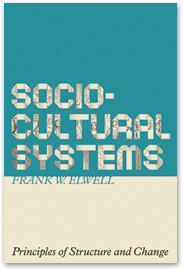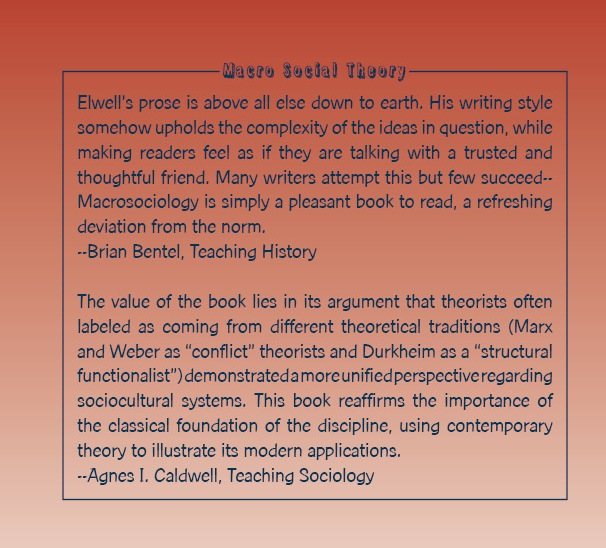
Sociocultural Systems: Principles of Structure and Change Macrosociology: Four Modern Theorists A Commentary on Malthus" 1798 Essay as Social Theory Great Classical Social Theorists In the Classical Tradition: Modern Social Theorists Dr. Elwell's Professional Page
|
rbert Spencer's Evolutionary
Sociology Emile Durkheim [1858-1917] | |
|
Emile Durkheim on Anomie
By Frank W. Elwell
According to Durkheim, social facts are the subject matter of sociology.
Social facts are “sui generis” (meaning of its own kind; unique) and
must be studied distinct from biological and psychological phenomenon.
Social facts can be defined as patterns of behavior that are capable of
exercising some coercive power upon individuals. They are guides and
controls of conduct and are external to the individual in the form of
norms, mores, and folkways. “A social fact is identifiable through the
power of external coercion which it exerts or is capable of exerting
upon individuals” (Durkheim, [1895] 1982, p. 56). Through
socialization and education these rules become internalized in the
consciousness of the individual. These constraints and guides become
moral obligations to obey social rules.  “There are in each of us…two consciences: one which is common to our group in its entirety…the other, on the contrary, represents that in us which is personal and distinct, that which makes us an individual” (Durkheim [1893] 1933, 129).
“Because society surpasses us, it obliges us to surpass ourselves, and
to surpass itself, a being must, to some degree, depart from its
nature—a departure that does not take place without causing more or less
painful tensions” (Durkheim [1914] 1973, 163).
“It is not without reason, therefore, that man feels himself to be
double: he actually is double….In brief, this duality corresponds to the
double existence that we lead concurrently; the one purely individual
and rooted in our organisms, the other social and nothing but an
extension of society” (Durkheim [1914] 1973, 162).
Our purely individual side seeks satisfaction of all wants and desires.
It knows no boundaries. This side of human beings quickly leads to a
condition that Durkheim labels as “anomie.” “It is this anomic state
that is the cause, as we shall show, of the incessantly recurrent
conflicts, and the multifarious disorders of which the economic world
exhibits so sad a spectacle”(Durkheim [1893] 1933, 5).
Durkheim characterized the modern individual as insufficiently
integrated into society. Because of these weakening bonds, social
regulation breaks down and the controlling influence of society on the
desires and interests of the individual is rendered ineffective;
individuals are left to their own devices. Because of the dual nature of
human beings this breakdown of moral guidance results in rising rates of
deviance, social unrest, unhappiness, and stress.
"The more one has, the more one wants, since satisfactions received only
stimulate instead of filling needs" (Durkheim [1897] 1951, 248).
“Unlimited desires are insatiable by definition and insatiability is
rightly considered a sign of morbidity. Being unlimited, they constantly
and infinitely surpass the means at their command; they cannot be
quenched. Inextinguishable thirst is constantly renewed torture" (247).
“To the extent that the individual is left to his own devices and freed
from all social constraint, he is unfettered too by all moral
constraint” (Professional Ethics and Civic Morals, Durkheim (7).
Durkheim identifies two major causes of anomie: the division of labor,
and rapid social change. Both of these are, of course, associated with
modernity. An increasing division of labor weakens the sense of
identification with the wider community and thereby weakens constraints
on human behavior. These conditions lead to social “disintegration”—high
rates of egocentric behavior, norm violation, and consequent de-legitimation
and distrust of authority. According to Durkheim, the desires and
self-interests of human beings can only be held in check by forces that
originate outside of the individual. Durkheim characterizes this
external force as a collective conscience, a common social bond that is
expressed by the ideas, values, norms, beliefs, and ideologies of a
culture. “As there is nothing within an individual which constrains
these appetites, they must surely be contained by some force exterior to
him, or else they would become insatiable—that is morbid” [1928] 1978,
p. 213).
As the collective conscience originates with society, Durkheim
elaborated the cause and effects of weakening group ties (and thus a
weakening of the collective conscience) on the individual in his two
works, The Division of Labor in Society (1893) and Suicide
(1897). In The Division of Labor, Durkheim identifies two forms
or types of solidarity, which are based on different sources, t
The second type Durkheim termed “Organic solidarity “which develops as a
by-product of the division of labor. As society becomes more complex,
individuals play more specialized roles and become ever more dissimilar
in their social experiences, material interests, values, and beliefs.
Individuals in such a sociocultural system have less in common;
however, they must become more dependent upon each other for their
survival. The growth of individualism is an inevitable result of the
increasing division of labor, and this individualism can only develop at
the expense of the common values, morality, beliefs, and normative rules
of society—the sentiments and beliefs that are held by all. With the
loosening of these common rules and values we also lose our sense of
community, or identity with the group. The social bond is thereby
weakened and social values and beliefs no longer provide us with
coherent or insistent moral guidance. And this loosening lends itself to
anomie.
Again, according to Durkheim, if an individual lacks any sense of social
restraint her self-interest will be unleashed; she will seek to satisfy
her own appetites with little thought on the possible affect her action
will have on others. Instead of asking “is this moral?” or “does my
family approve?” the individual is more likely to ask “does this action
meet my needs?” The individual is left to find her own way in the
world—a world in which personal options for behavior have multiplied as
strong and insistent norms and moral guidelines have weakened. For a more extensive discussion of Durkheim’s theories refer to Macro Social Theory by Frank W. Elwell. Also see Sociocultural Systems: Principles of Structure and Change to learn how his insights contribute to a more complete understanding of modern societies.
Bibliography
Durkheim, E. (1956). Education and Sociology. (S. Fox, Trans.)
New York: The Free Press.
Durkheim, E. (1925/1961). Moral Education: A Study in the Theory and
Application of the Sociology of Education. (E. Wilson, & H. Schnurer,
Trans.) New York: The Free Press.
Durkheim, E.
(1953). Sociology
and Philosophy.
New York: The
Free Press.
Durkheim, E. (1897/1951). Suicide: A Study in Sociology. (J.
Spaulding, & G. Simpson, Trans.) New York: The Free Press.
Durkheim, E. (1893/1960). The Division of Labor in Society. (G.
Simpson, Trans.) New York: The Free Press.
Durkheim, E. (1912/1954). The Elementary Forms of Religious Life.
(J. Swain, Trans.) New York: The Free Press.
Elwell, F. (2009), Macrosociology: The Study of Sociocultural Systems.
Lewiston: Edwin Mellen Press.
Elwell, F. (2013), Sociocultural Systems: Principles of Structure and
Change. Alberta: Athabasca University Press.
Mestrovic, S. G. (1988/1993). Emile Durkheim and the Reformation of
Sociology. Boston: Rowman & Littlefield Publishers.
Mestrovic, S. G. (1997). Postemotional Society. London: Sage
Publications.
Mestrovic, S. G. (1994). The Balkanization of the West: The
Confluence of Postmodernism and Postcommunism. New York: Routledge.
Mestrovic, S. G. (1993). The Barbarian Temperment: Toward a
Postmodern Critical Theory. New York: Routledge.
To reference Emile Durkheim on Anomie, you should use the following format: Elwell, Frank W., 2003, Emile Durkheim on Anomie, Retrieved August 31, 2003, [use actual date] http://www.faculty.rsu.edu/~felwell/Theorists/Essays/Durkheim1.htm
©2013 Frank Elwell, Send comments to felwell at rsu.edu |
 “When there is no other aim but to outstrip constantly the point arrived
at, how painful to be thrown back!...Since imagination is hungry for
novelty, and ungoverned, it gropes at random” (257).
“When there is no other aim but to outstrip constantly the point arrived
at, how painful to be thrown back!...Since imagination is hungry for
novelty, and ungoverned, it gropes at random” (257). he first
is Mechanical solidarity. Mechanical solidarity is “solidarity which
comes from likeness and is at its maximum when the collective conscience
completely envelops our whole conscience and coincides in all points
with it.” Mechanical solidarity occurs in early societies in which there
is not much division of labor. Such societies are relatively homogenous,
men and women engage in similar tasks and daily activities, people have
similar experiences. In such societies the few distinct institutions
express similar values and norms and tend to reinforce one another. The
norms, values, and beliefs of the society (or the collective conscience)
are so homogenous and confront the individual with such overwhelming and
consistent force, that there is little opportunity in such societies for
individuality or deviance from this collective conscience. According to
Durkheim, traditional cultures experience a high level of social and
moral integration, there was little individuation, and most behaviors
were governed by social norms which were usually embodied in religion.
By engaging in the same activities and rituals, people in traditional
societies shared common moral values, which Durkheim called a collective
conscience. In these societies, people tend to regard themselves as
members of a group; the collective conscience embraces individual
awareness, and there is little sense of personal options.
he first
is Mechanical solidarity. Mechanical solidarity is “solidarity which
comes from likeness and is at its maximum when the collective conscience
completely envelops our whole conscience and coincides in all points
with it.” Mechanical solidarity occurs in early societies in which there
is not much division of labor. Such societies are relatively homogenous,
men and women engage in similar tasks and daily activities, people have
similar experiences. In such societies the few distinct institutions
express similar values and norms and tend to reinforce one another. The
norms, values, and beliefs of the society (or the collective conscience)
are so homogenous and confront the individual with such overwhelming and
consistent force, that there is little opportunity in such societies for
individuality or deviance from this collective conscience. According to
Durkheim, traditional cultures experience a high level of social and
moral integration, there was little individuation, and most behaviors
were governed by social norms which were usually embodied in religion.
By engaging in the same activities and rituals, people in traditional
societies shared common moral values, which Durkheim called a collective
conscience. In these societies, people tend to regard themselves as
members of a group; the collective conscience embraces individual
awareness, and there is little sense of personal options.